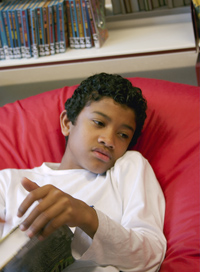Archived Content
The National Institute of Mental Health archives materials that are over 4 years old and no longer being updated. The content on this page is provided for historical reference purposes only and may not reflect current knowledge or information.
Depressed Teens with History of Abuse Less Likely to Respond to Combination Treatment
• Science Update

Adolescents with treatment-resistant depression who have a history of abuse—especially physical abuse—are less likely to respond to combination treatment than to medication alone, according to data from the NIMH-funded Treatment of Resistant Depression in Adolescents (TORDIA) study. The new study was published in the March 2011 issue of the Journal of the American Academy of Child and Adolescent Psychiatry.
Background
Although the relationship between childhood abuse and risk for depression or other mental disorder is well-established, few studies have examined whether a history of abuse may affect response to treatment, especially among adolescents. Some studies have suggested that a history of abuse is associated with a lower response to cognitive behavioral therapy (CBT), a type of psychotherapy that emphasizes problem-solving and behavior change.
In the Treatment of Resistant Depression in Adolescents (TORDIA) study, teens whose depression had not improved after an initial course of selective serotonin reuptake inhibitor (SSRI) antidepressant treatment were randomly assigned to one of four interventions for 12 weeks:
- Switch to another SSRI—paroxetine (Paxil), citalopram (Celexa) or fluoxetine (Prozac)
- Switch to a different SSRI plus CBT
- Switch to venlafaxine (Effexor), a different type of antidepressant called a serotonin and norepinephrine reuptake inhibitor (SNRI)
- Switch to venlafaxine plus CBT
As reported in May 2010, about 40 percent of those who completed 24 weeks of treatment achieved remission, regardless of the treatment to which they had initially been assigned. The risk for relapse remained high, however.
About 13 percent of TORDIA participants had a history of physical abuse, 17 percent had a history of sexual abuse, and 5 percent had a history of both. In this most recent study, Wael Shamseddeen, M.D., MPH, of Rosalind Franklin University of Medicine and Sciences in North Chicago, and colleagues examined the association between having a history of physical or sexual abuse and response to combination treatment among TORDIA participants.
Results of the Study
The researchers found that teens without a history of abuse had a higher response rate to combination therapy compared to medication-only therapy (63 percent vs. 37.6 percent). Those with a history of sexual abuse responded similarly to combination and medication-only therapy (48 percent vs. 42 percent). However, those with a history of physical abuse had a much lower response rate to combination therapy (18.4 percent) compared to medication-only (52.4 percent).
Significance
The researchers were unable to identify the specific mechanism that might affect response to combination therapy among teens with a history of physical abuse. They suggest that because abuse can affect a child's brain development, abused youth may need psychotherapeutic approaches that target trauma before engaging in traditional CBT designed to treat depression. The researchers also suggest that abused youth may have a tendency to avoid unpleasant emotions, and therefore may have been averse to CBT. It is possible that therapeutic approaches that focus more on behavior and do not rely heavily on the processing of negative thoughts and emotions may be more acceptable and effective for these youth.
What's Next
The researchers concluded that more research is needed into the ways in which abuse history can confer treatment resistance among teens with hard-to-treat depression, and in developing alternative treatment approaches that are more effective.
Reference
Shamseddeen W, Asarnow JR, Clarke G, Vitiello B, Wagner KD, Birmaher B, Keller MB, Emslie G, Iyengar S, Ryan ND, McCracken JT, Porta G, Mayes T, Brent D. Impact of physical and sexual abuse on treatment response in the Treatment of Resistant Depression in Adolescents Study (TORDIA). Journal of the American Academy of Child and Adolescent Psychiatry. 2011 March. 50(3):293-301.
